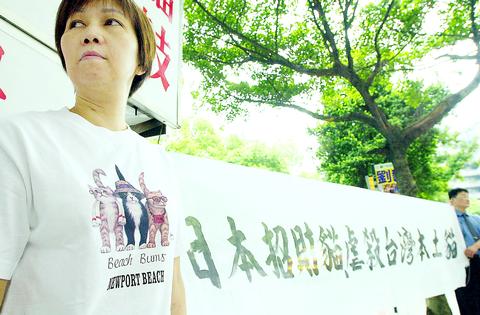Animal rights activists asked Japanese officials yesterday to stop the trade in cat hides, which are used in Japan to make drums.
Activists yesterday delivered a petition to the Interchange Association, Japan's de facto embassy in Taiwan, urging the office to stop the practice.

PHOTO: GEORGE TSORNG, TAIPEI TIMES
Though the association accepted the petition, a representative of the office said it wouldn't take any action to stop the trade unless the demand for cat hides dropped off.

PHOTO: TAIWAN UNITED ANIMAL PROTECTION ASSOCIATION
Chihara Tsuruoka, chief of the association's economic section, accepted the group's petition and promised to relay its concerns to the Japanese government.
Chung Yi-chen (
"They told us that they will not stop the supply unless there is no demand in the market," Chung said. "The Japanese government should realize the severity of the problem and stop this barbaric practice immediately."
Because the trade exists, stray animals are finding it hard to survive in a metropolis such as Taipei, Chung said.
"The city's `keep trash off the ground' program makes it hard for stray animals to find food to eat," Chung said. "The number of stray animals in the city has also dwindled over the years thanks to the city's stray-animal policy."
In addition to petitioning the Japanese government yesterday, the group asked the central government to crack down on illegal cat slaughter houses -- most of which located in central and southern Taiwan.
The group also called on the government to set up inspections at customs posts and empower police to take stiffer action against cat traders.
In addition, the group asked the central government to help cat vendors find other jobs, in addition to issuing severe fines and pressing criminal charges against them.
According to the Animal Protection Law, which went into effect in November 1999, fines for those convicted of torturing animals range between NT$2,000 and NT$50,000.
The minimum market price for a cat is estimated at NT$800.
Lee Tieh-kun (
"I saw about 30 cats squeezed into four small bamboo cages in the back of their pickup truck," Lee said. "Although police took down their names and license number, they failed to run a computer check before letting them go."
Lee added that one of her friends managed to visit an illegal slaughterhouse in southern Taiwan, and had shot footage of the slaughter process.
"They don't feed them any food or water after capturing them," Lee said. "They then hit them on the head and drown them in a pool of water before slicing open their abdomen. The hides go to Japan, the meat is sold to restaurants and the bones go to meat markets."
Another cat lover, Chen Jin-moon (

GAINING STEAM: The scheme initially failed to gather much attention, with only 188 cards issued in its first year, but gained popularity amid the COVID-19 pandemic Applications for the Employment Gold Card have increased in the past few years, with the card having been issued to a total of 13,191 people from 101 countries since its introduction in 2018, the National Development Council (NDC) said yesterday. Those who have received the card have included celebrities, such as former NBA star Dwight Howard and Australian-South Korean cheerleader Dahye Lee, the NDC said. The four-in-one Employment Gold Card combines a work permit, resident visa, Alien Resident Certificate (ARC) and re-entry permit. It was first introduced in February 2018 through the Act Governing Recruitment and Employment of Foreign Professionals (外國專業人才延攬及雇用法),

RESILIENCE: Deepening bilateral cooperation would extend the peace sustained over the 45 years since the Taiwan Relations Act, Greene said Taiwan-US relations are built on deep economic ties and shared values, American Institute in Taiwan (AIT) Director Raymond Greene said yesterday, adding that strengthening supply chain security in critical industries, enhancing societal resilience through cooperation and deepening partnerships are key to ensuring peace and stability for Taiwan in the years ahead. Greene made the remarks at the National Security Youth Forum, organized by National Taiwan University’s National Security and Strategy Studies Institution in Taipei. In his address in Mandarin Chinese, Greene said the Taiwan-US relationship is built on deep economic ties and shared interests, and grows stronger through the enduring friendship between

CAUTION URGED: Xiaohongshu and Douyin — the Chinese version of TikTok — are tools the Chinese government uses for its ‘united front’ propaganda, the MAC said Mainland Affairs Council (MAC) Minister Chiu Chui-cheng (邱垂正) yesterday urged people who use Chinese social media platforms to be cautious of being influenced by Beijing’s “united front” propaganda and undermining Taiwan’s sovereignty. Chiu made the remarks in response to queries about Chinese academic Zhang Weiwei (張維為) saying that as young Taiwanese are fond of interacting on Chinese app Xiaohongshu (小紅書, known as RedNote in English), “after unification with China, it would be easier to govern Taiwan than Hong Kong.” Zhang is professor of international relations at Shanghai’s Fudan University and director of its China Institute. When giving a speech at China’s Wuhan

ENHANCE DETERRENCE: Taiwan has to display ‘fierce resolve’ to defend itself for China to understand that the costs of war outweigh potential gains, Koo said Taiwan’s armed forces must reach a high level of combat readiness by 2027 to effectively deter a potential Chinese invasion, Minister of National Defense Wellington Koo (顧立雄) said in an interview with the Chinese-language Liberty Times (sister newspaper of the Taipei Times) published yesterday. His comments came three days after US Secretary of State Marco Rubio told the US Senate that deterring a Chinese attack on Taiwan requires making a conflict “cost more than what it’s worth.” Rubio made the remarks in response to a question about US policy on Taiwan’s defense from Republican Senator John Cornyn, who said that Chinese